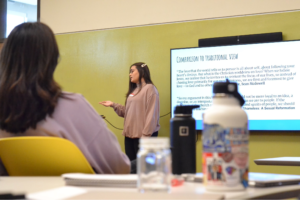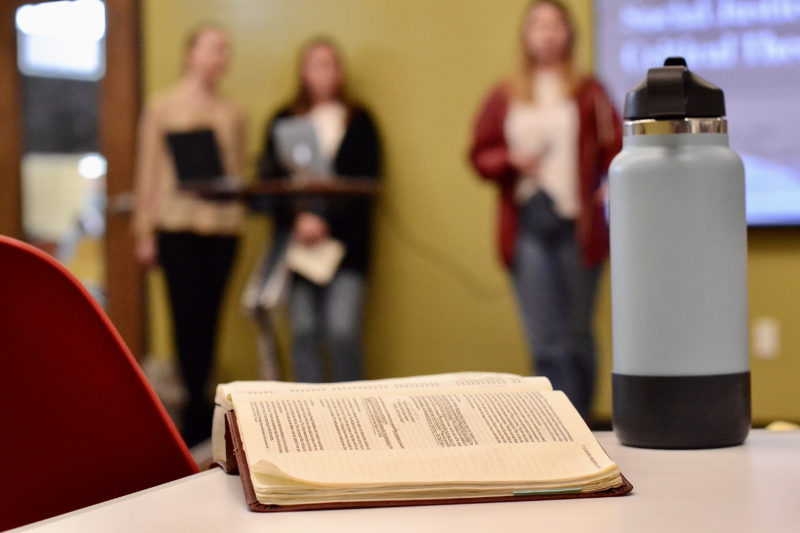Some of our latest class days have been filled with hearing different insights on several philosophical eras, how they have affected Christianity and the growing prominence of progressive Christianity.
How has Christianity been impacted by centuries of philosophy?
 Jonathan Morrow presented a lecture on the integration of philosophy and theology throughout the past few centuries. The class focused on the concept of epistemology (the study of knowledge) and the most acknowledged philosophical thinkers who have influenced it through time, including David Hume, Descartes, and Copernicium. Jonathan walked us through the historical definitions of knowledge, belief, truth, and justification to provide us with the tools to aptly have conversations with a culture that is redefining these terms.
Jonathan Morrow presented a lecture on the integration of philosophy and theology throughout the past few centuries. The class focused on the concept of epistemology (the study of knowledge) and the most acknowledged philosophical thinkers who have influenced it through time, including David Hume, Descartes, and Copernicium. Jonathan walked us through the historical definitions of knowledge, belief, truth, and justification to provide us with the tools to aptly have conversations with a culture that is redefining these terms.
By using these definitions, we practiced thinking through and having discussions about the differences between pre-modernism, modernism, and postmodernism.
Before finishing the lecture, he also gave us a few key questions we should be asking ourselves and answering in order to live well:
- How will you see reality?
- Who are you surrendering yourself to?
- Who will you learn from?
- Who will you ultimately live for?
What is Progressive Christianity?
 We’ve also had the opportunity to hear from Alisa Childers, author of Another Gospel, an apologetics book for doubting Christians and skeptics who want to seek truth and know how to respond to progressive Christianity. We learned that progressive Christianity is centered around deconstruction.
We’ve also had the opportunity to hear from Alisa Childers, author of Another Gospel, an apologetics book for doubting Christians and skeptics who want to seek truth and know how to respond to progressive Christianity. We learned that progressive Christianity is centered around deconstruction.  This is different than having doubts about your faith. Instead of leading a person to ask good questions and seek truth, it ultimately leads people away from the truth and their faith. This happens because progressive Christianity is deeply affected by relativism, which we see in the “you do you” and “what’s true for you is true for you and what’s true for me is true for me” mantras. A lifestyle of focusing on our own ideas of what is true makes a person come up with their own definitions for what is true instead of aligning what they feel and think to reality and objective truth.
This is different than having doubts about your faith. Instead of leading a person to ask good questions and seek truth, it ultimately leads people away from the truth and their faith. This happens because progressive Christianity is deeply affected by relativism, which we see in the “you do you” and “what’s true for you is true for you and what’s true for me is true for me” mantras. A lifestyle of focusing on our own ideas of what is true makes a person come up with their own definitions for what is true instead of aligning what they feel and think to reality and objective truth.
Finishing out the week, we grouped up to share what we learned about progressive Christianity. Through the class discussion, books we read, and deeper research, we created group presentations that covered key aspects of progressive Christianity and how they compare to historic Christianity. These areas of clear differentiation included inerrancy of the Bible, love, judgment and tolerance, justice, and hell.
 One presentation showed how progressive Christianity removes the gravity and depth of the atonement. While Jesus’ sacrificial act does bring hope to our world, in progressive Christianity, this is all Jesus is – a universal symbol of hope. This is in direct contrast to historic Christianity, which believes Jesus died to overcome death which is the effect of sin.
One presentation showed how progressive Christianity removes the gravity and depth of the atonement. While Jesus’ sacrificial act does bring hope to our world, in progressive Christianity, this is all Jesus is – a universal symbol of hope. This is in direct contrast to historic Christianity, which believes Jesus died to overcome death which is the effect of sin.
Another group explained how progressive Christianity contradicts historic Christianity in the way it views the Bible. Progressive Christianity does not view the Bible as the Word of God, instead, it simply contains it, and infallible does not necessarily mean “without error.”
 When asked what she found interesting about the topic her team researched, Audrey Lane answered “my topic was critical theory and the broadness of the topic made it difficult to establish the Christian perspective, because it was hard to communicate the main ideas since none of the definitions were objective. However, diving deep into the emphasis the gospel has on how we interact with others in our world was super helpful.”
When asked what she found interesting about the topic her team researched, Audrey Lane answered “my topic was critical theory and the broadness of the topic made it difficult to establish the Christian perspective, because it was hard to communicate the main ideas since none of the definitions were objective. However, diving deep into the emphasis the gospel has on how we interact with others in our world was super helpful.”
by Danelle Gonzalez
